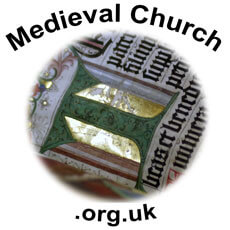Theology on the Web helps over 2.5 million people every year to find high quality theological resources that will help to equip them to serve God and to know Him better (2 Timothy 2:15). Like other websites that provide free services, it is dependent on donations to enable it to grow and develop and only 0.004% of visitors currently do so. If you would like to support this site, please use one of the options to the right of this message.
Synopsis
PETER THE VENERABLE. Pierre Maurice
de Montboisier, called "the Venerable," was b. in Auvergne, France, 1092 [94],
and d. Christmas Day, 1156 [58], at Cluny. FIe was the seventh son of Maurice,
Lord of Montboisier, and of Ringarde his wife. Four of his brothers betame
ecelesiastics also; and one, Armannus, was prior of Cluny. At seventeen years
of age Peter became a monk of Cluny, and at thirty (1122) he was elected abbot.
He reformed the abbey, and established good management in all its distracted
affairs. His rules are extant, and speak abundantly for his judgment, which was
sorely tried by the return of Pontius, the previous abbot, who had been forced
to go on a pilgrimage to Palestine, and resign his office. After a sharp
struggle, Peter was sustained in his rule. His name of "the Venerable" was
derived from his largeness of body and mind, his benevolent face, and his
Christian charity. Bernard of Cluny was probably his prior. Peter was the first
to acknowledge Innocent II. as pope, against Anacletus, his rival claimant, who
had in fact been a Cluniac monk. This just and generous attitude is in strong
contrast to that of Innocent and of St. Bernard, who seeni equally to have
disregarded Peter and his motives. To meet their insinuations against laxity of
discipline, he called a general chapter of his order (Benedictines), at which
"two hundred priors and a thousand ecclesiastics" were present, who supported
him in a more stringent rule Peter’s writings embrace Epistles (lib. 6.
22, to Heloise, being notably fine), and Tracts against the Petrobrusians,
,Jews, and Mohammedans,1 together with a few Hymns
and Sequences. His principal claims to modern honor lie (1) in his having
secured a Latin translation of the Koran through his own labors and those of
some of his monks; (2) in his kind treatment of Abelard, whom he received after his defeat by Bernard,
and ten4erly cared for until he died, and whose body lie delivered to Heloise;
and (3) in his hymn "Mortis, portis, fractms, fortis," on the
resurrection. This is the conjectured original of Bishop Heber’s "God is
gone up with a merry noise." Peter was decidedly broader and more genial than
his age and surroundings, but his writings are of slight value. Fl. lllyricus
quotes him, however, as one of his "witnesses." He was but a poor Latinist;
yet, in his sermon on the transfiguration, he displays real rhetorical power.
His burial was beside his comrade, Henry of Blois, Bishop of Winchester, within
the church at Cluny.
1 An
inaccurate, offensive and obsolete name for Muslims. It should not be used by
modern writers.
Samuel W. Duffield, "Peter the Venerable."
Philip Schaff, ed., A Religious Encyclopaedia or Dictionary of Biblical,
Historical, Doctrinal, and Practical Theology, 3rd edn, Vol. 4. Toronto,
New York & London: Funk & Wagnalls Company, 1894. p.1819. Footnote
mine.
 |
J.M.
Wallace-Hadrill, translator. The Fourth Book of the Chronicle of Fredegar
with its Continuations. New York: Nelson, 1960. pp.97-121. |
Related Subjects











